Top 10 Matillion Competitors & Alternatives 2026
Summarize this article with:
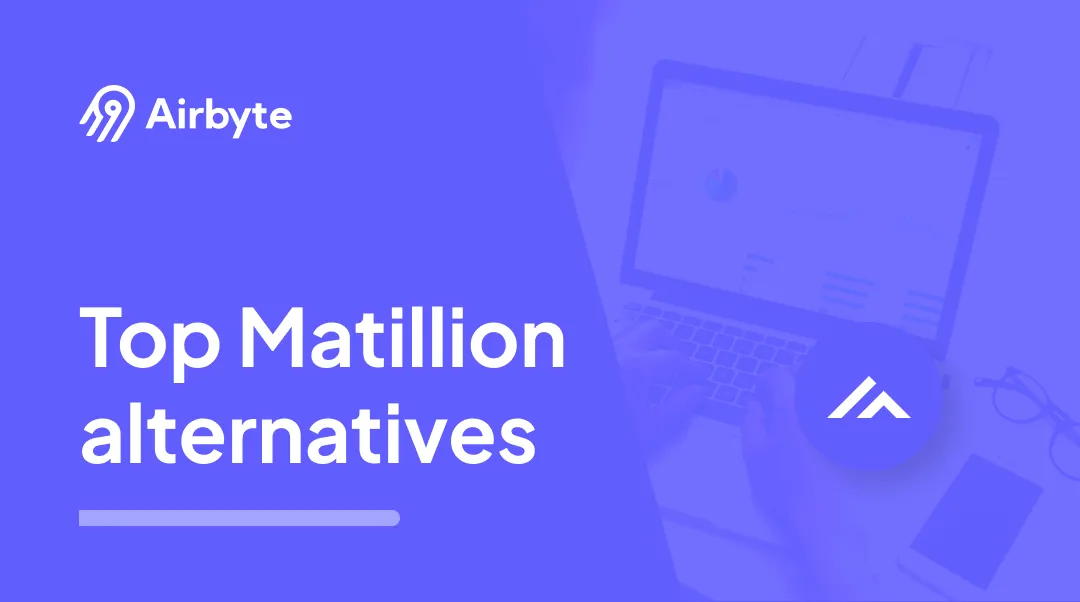
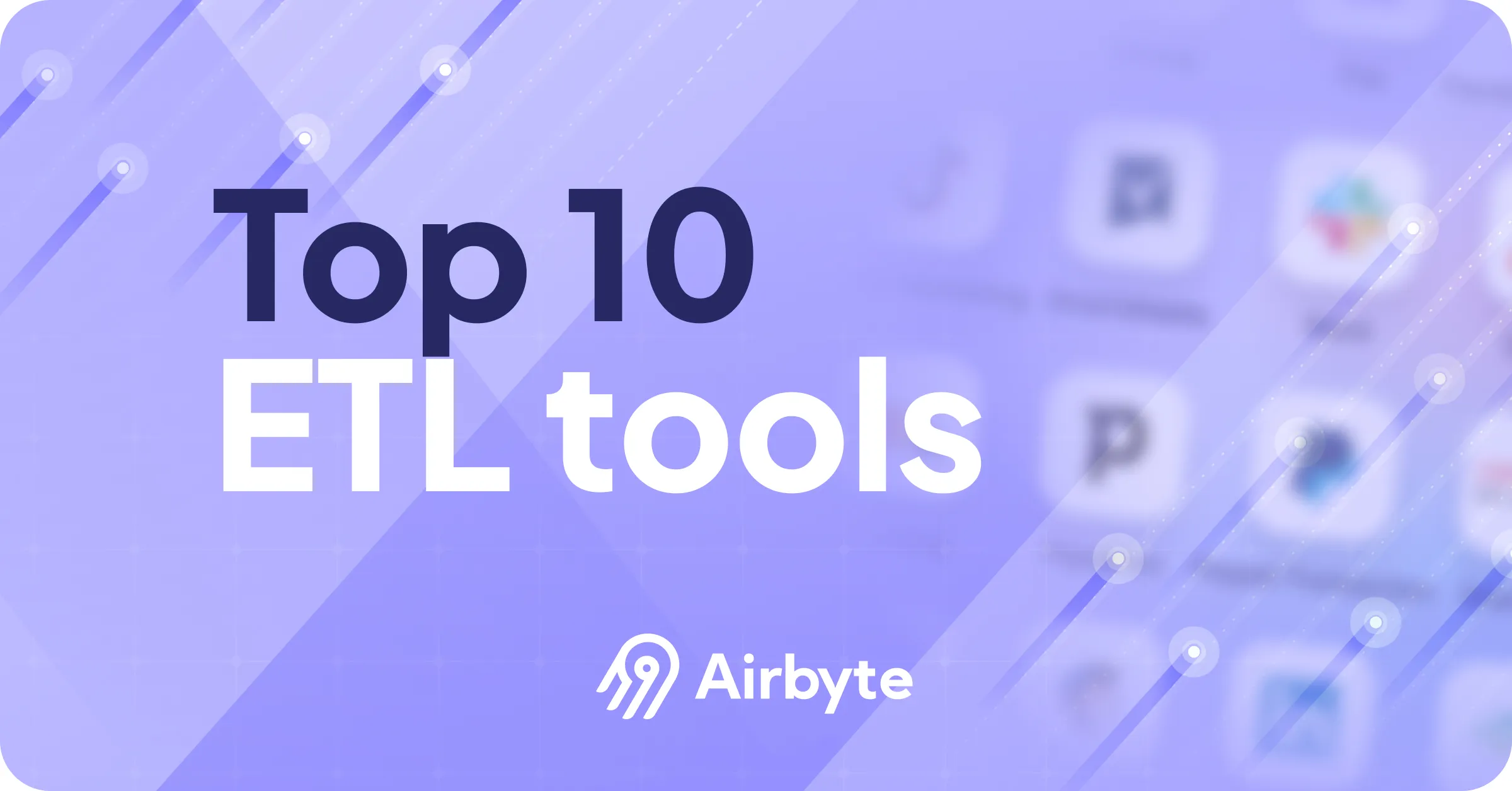
What is Matillion?
Matillion is a cloud-based platform that simplifies the data integration processes. It allows you to collect data from multiple sources and load it into a unified system. Leveraging the power of cloud-based platforms, Matillion facilitates data extraction, transformation, loading, and orchestration to support business analytics. Apart from integration features, it is also equipped with transformation capabilities like data cleansing, profiling, and enrichment to facilitate seamless data visualization and position itself strongly among Matillion alternatives.
Key Features of Matillion:
- It has a user-friendly drag-and-drop interface that lets you perform several data integration processes effortlessly. You can accomplish these processes with little technical expertise, allowing you to gather, prepare, and load data without hassle.
- Matillion supports multi-cloud platforms such as Snowflake, AWS, Azure, and Google Cloud, thus making it easier to integrate data from diverse sources.
- With Matillion, you get around 150 pre-built connectors to simplify your data connection between the source and the destination.
1. Airbyte
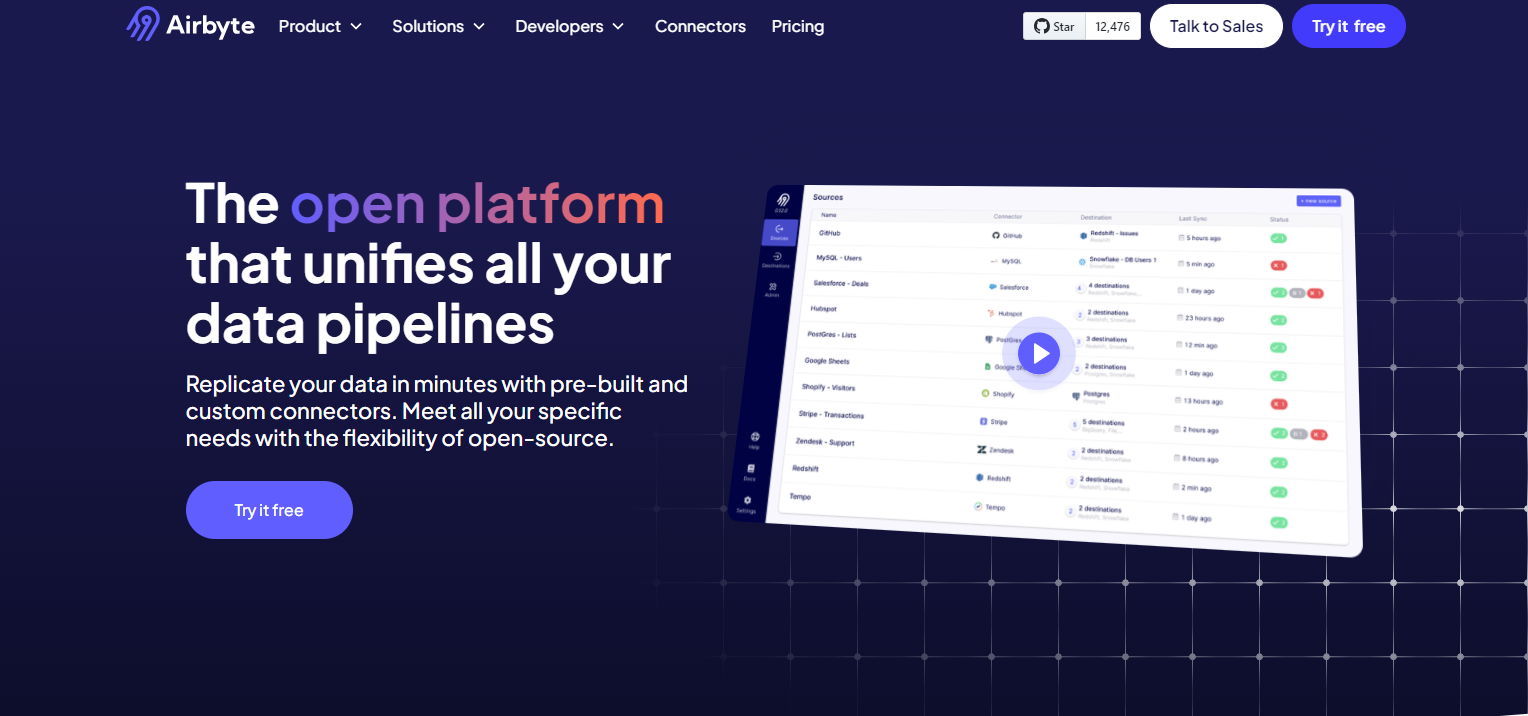
Airbyte is a robust data integration and replication platform that allows you to synchronize data from diverse sources and load it to your preferred destination. With a wide range of connectors, you can seamlessly gather and integrate data from multiple locations, such as SaaS applications and flat files, and load it to data lakes, warehouses, or vector databases.
In case your required connector is not available in the pre-built list, you have the flexibility to create custom connectors using the no-code connector builder or low-code Connector Development Kit within minutes.
Key features of Airbyte:
- AI-Powered Connector Builder: To further streamline the connector development process, Airbyte now offers an AI assistant for the connector builder option. With this feature, you can automatically fill in many details, such as pagination, authentication, primary key, etc. This assistant also provides suggestions to help you configure the connectors smoothly.
- Data Synchronization: Airbyte supports the Change Data Capture feature, enabling you to replicate incremental changes from the source into your destination systems. Thus, you can effortlessly track the modifications made to your data and manage it seamlessly.
- Enhanced Security: It has advanced security features to ensure data integrity and protection. Some include access controls, authentication mechanisms, encryption, audit logging, regular security assessments, and community engagement.
- Comprehensive Monitoring Options: It offers various options for monitoring ELT pipelines. One of them includes integration with Datadog, which allows you to monitor and analyze your data pipelines directly within Datadog's dashboards without incurring additional costs.
Refer to Airbyte vs Matillion to delve deeper into the different features provided by Airbyte and Matillion. This guide offers a comprehensive comparison of their capabilities and functionalities.
2. Fivetran
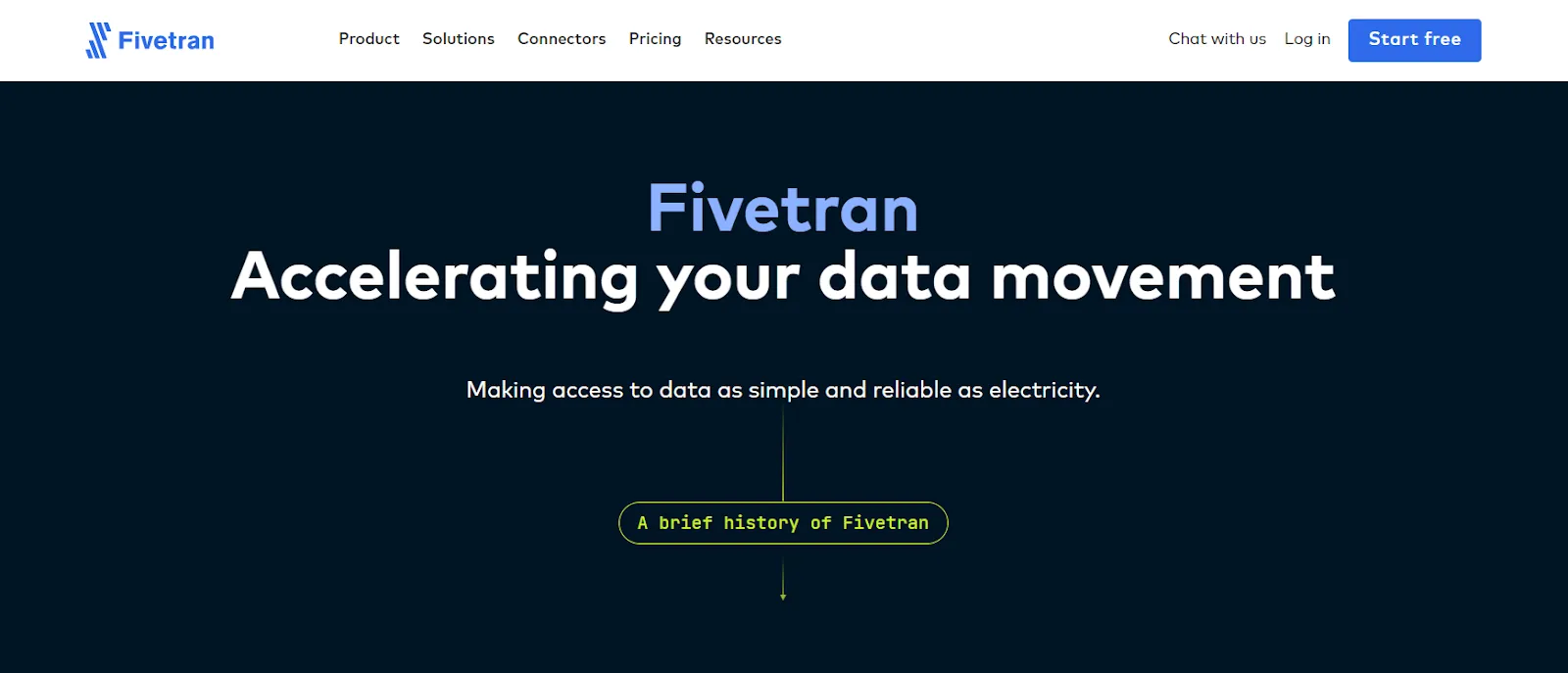
Developed in 2012, Fivetran is a cloud-based data integration platform that delivers high-end performance by syncing data automatically. It has many pre-built connectors, enabling seamless data extraction and loading processes into a centralized database or data warehouse from diverse sources.
Key features of Fivetran:
- Fivetran ensures data governance and security by adhering to standard security practices such as column blocking and hashing. Column Blocking allows you to restrict specific columns from being replicated to your target system. In contrast, hashing focuses on securing your Personally Identifiable Information (PII) before loading them to the destination.
- It offers a range of deployment options to accommodate various preferences. This includes self-hosted, cloud-based, and hybrid deployment.
3. Hevo Data
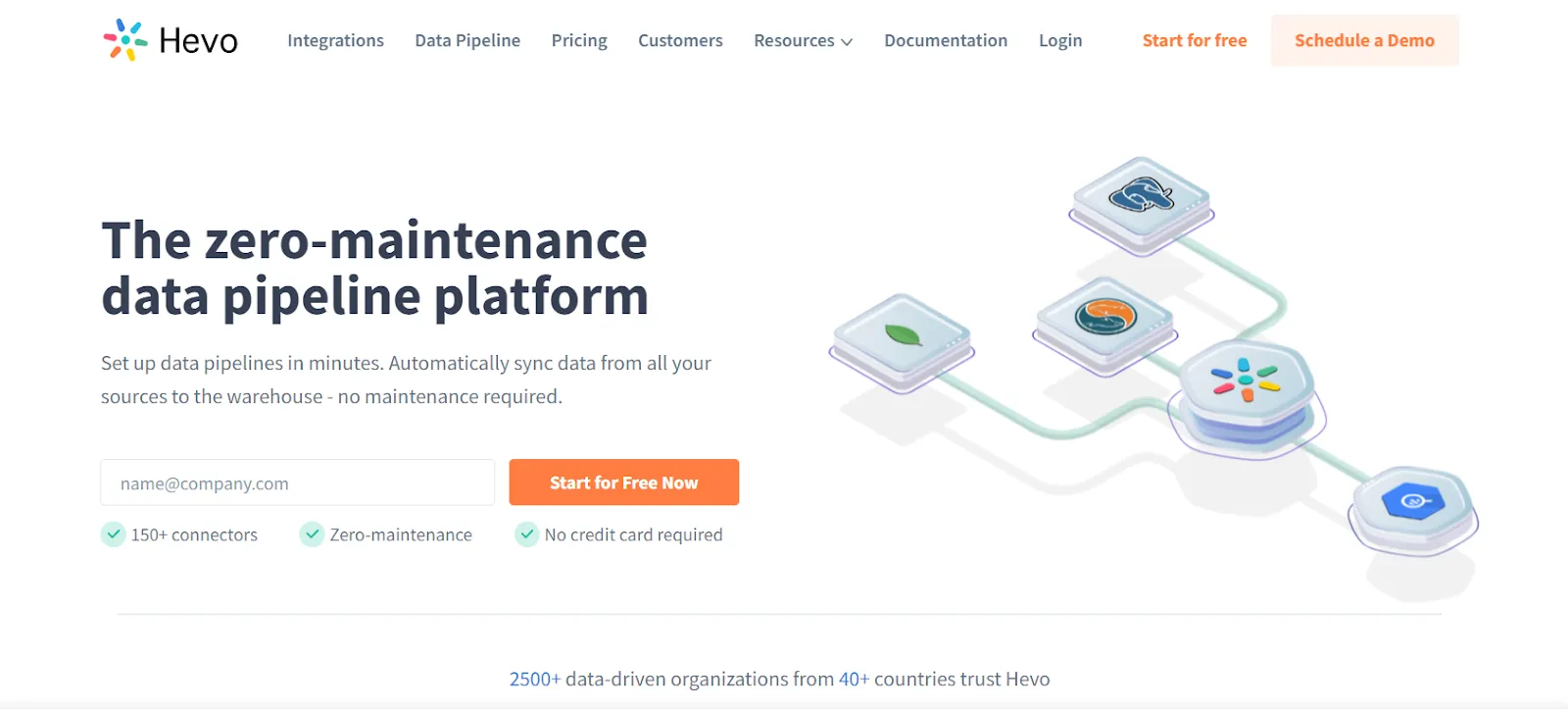
Hevo Data is another data integration platform that provides end-to-end automated data pipelines. It allows you to extract data from 150+ sources, including SaaS applications, databases, or data warehouses, and load it to more than 15 destinations with the help of its pre-built connectors. Once the data is unified in a centralized repository, you can efficiently utilize it for data analytics and visualization.
Key features of Hevo Data:
- Hevo Data’s fault-tolerant architecture prevents data loss and maintains absolute data accuracy with minimal latency during the integration process.
- With Hevo’s CDC technique, you can replicate data updates from your source systems to your destinations.
4. Stitch Data
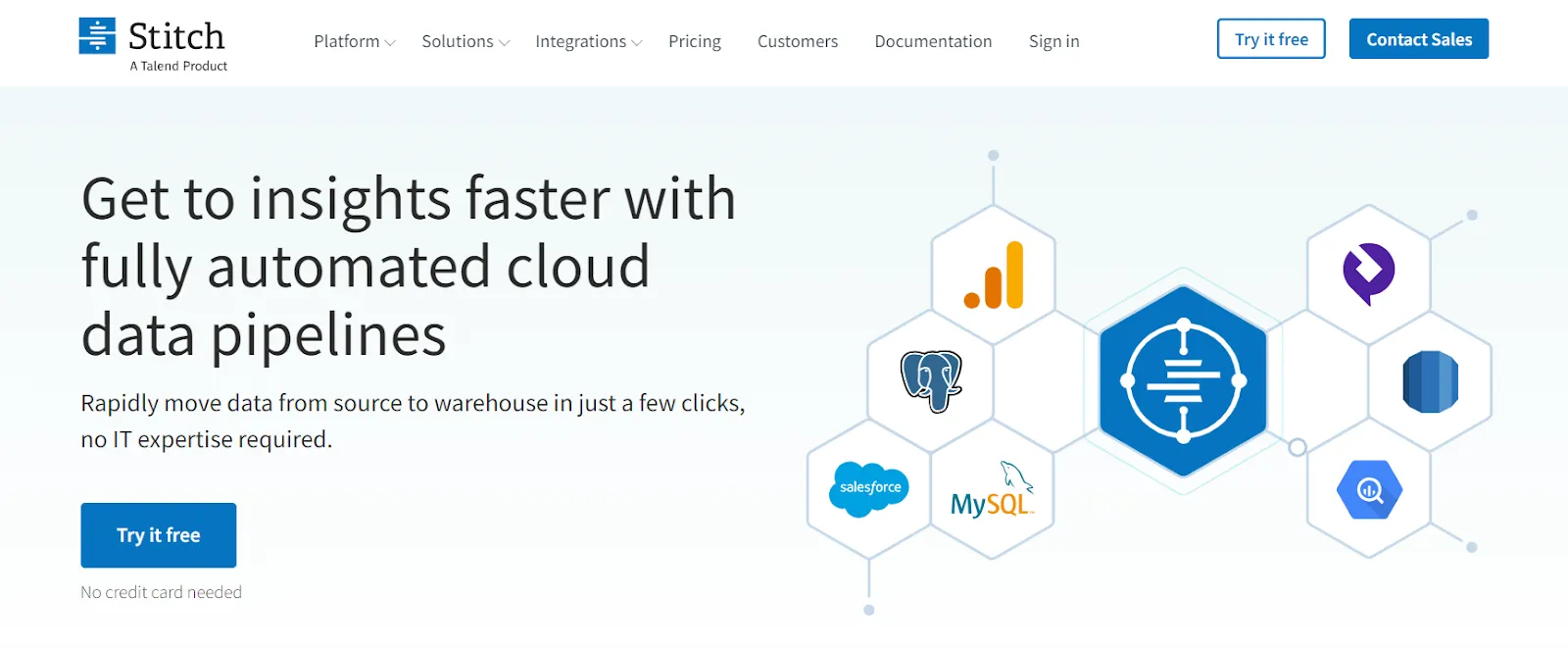
Stitch Data by Talend is a cloud-based data integration platform that allows the movement of data records from databases and SaaS applications to data lakes and warehouses. Along with integration capabilities, this platform also prioritizes data security and compliance by offering access control and encryption features. While transferring data from source to destination, you can employ its secure options, such as IP whitelisting, SSH tunneling, and SSL/TLS.
Key features of Stitch Data:
- Stitch has an extensive library of pre-built connectors that support more than 100 data sources to set your data pipelines within minutes. This enables you to manage your data efficiently and draw practical insights from your datasets.
- With Stitch, you can maintain data transparency and control your data pipelines. It offers orchestration capabilities that allow you to manage your data as it is replicated from data sources
5. Alteryx
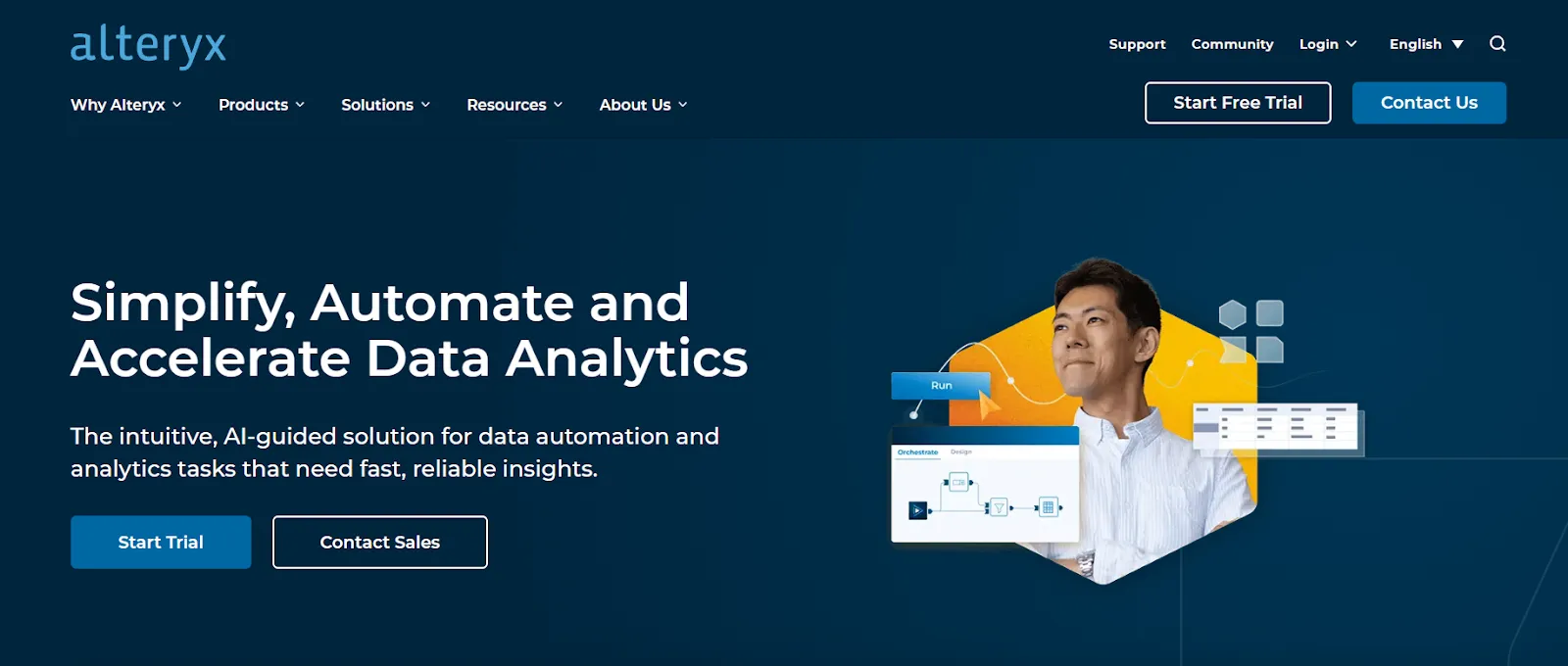
Alteryx is a comprehensive data analytics and ETL platform known for its user-friendly interface and robust data blending capabilities. It enables organizations to prepare, analyze, and visualize complex datasets without extensive coding. Popular among enterprises, Alteryx simplifies data workflows and enhances analytical capabilities, making it a powerful solution for those seeking an end‐to‐end data analytics experience.
Key Features of Alteryx:
- Features an intuitive drag-and-drop interface that streamlines complex ETL workflows and minimizes development time. It provides seamless integration with diverse data sources, empowering both technical and non-technical users to quickly create and deploy efficient data pipelines.
- Integrates advanced analytics—including predictive, spatial, and statistical tools—to deliver deep insights and support robust data preparation, visualization, and informed decision-making.
6. SnapLogic
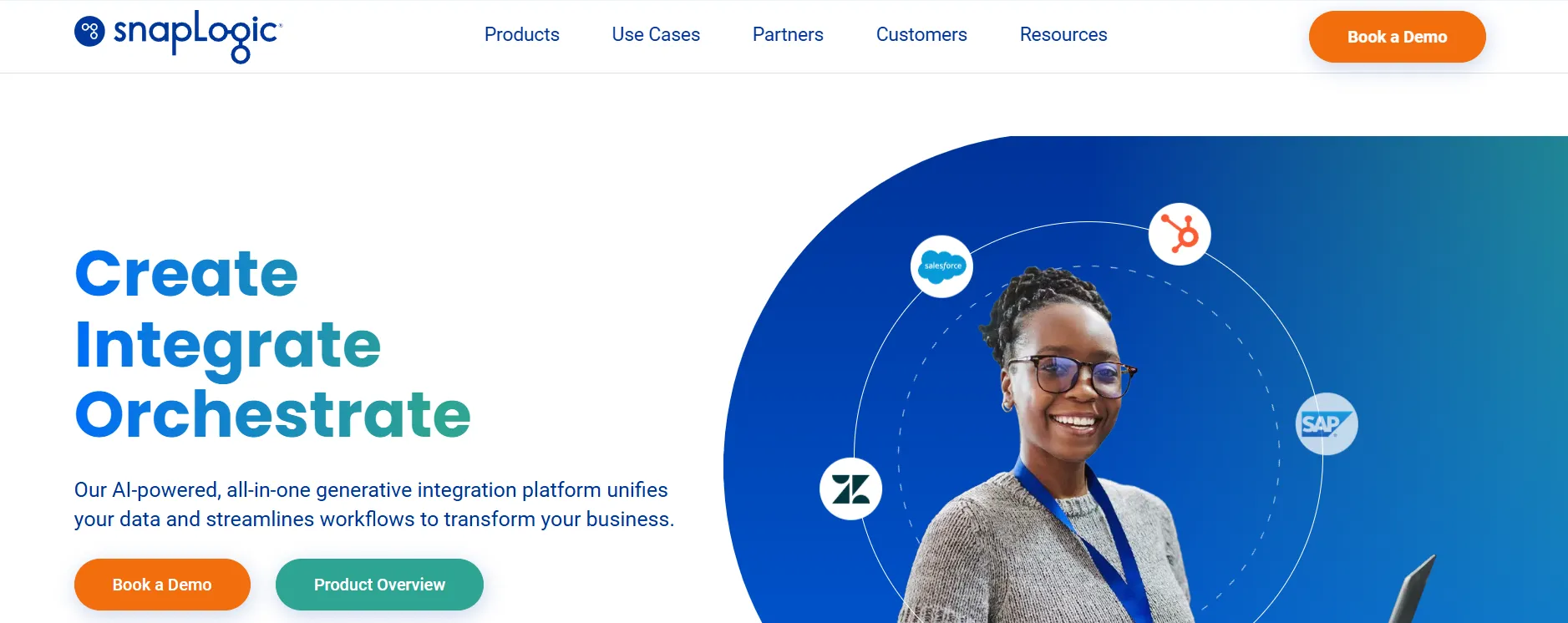
SnapLogic is a cloud-based integration platform that leverages AI-driven automation to streamline data integration, application connectivity, and workflow orchestration. SnapLogic enables businesses to automate complex processes and unify data across diverse environments. Its scalable design supports both real-time and batch processing, making it ideal for enterprises seeking agility in their data operations. SnapLogic is widely recognized for its ability to simplify integrations without requiring extensive coding, empowering technical and non-technical users.
Key Features of SnapLogic:
- SnapLogic integrates Generative AI capabilities to automate workflows, enhance productivity, and enable efficient data movement across applications, databases, APIs, and more.
- With over 1,000 pre-built "Snaps," SnapLogic simplifies the integration of various systems, including cloud data warehouses, SaaS applications, and APIs, ensuring seamless connectivity across the enterprise.
7. Talend
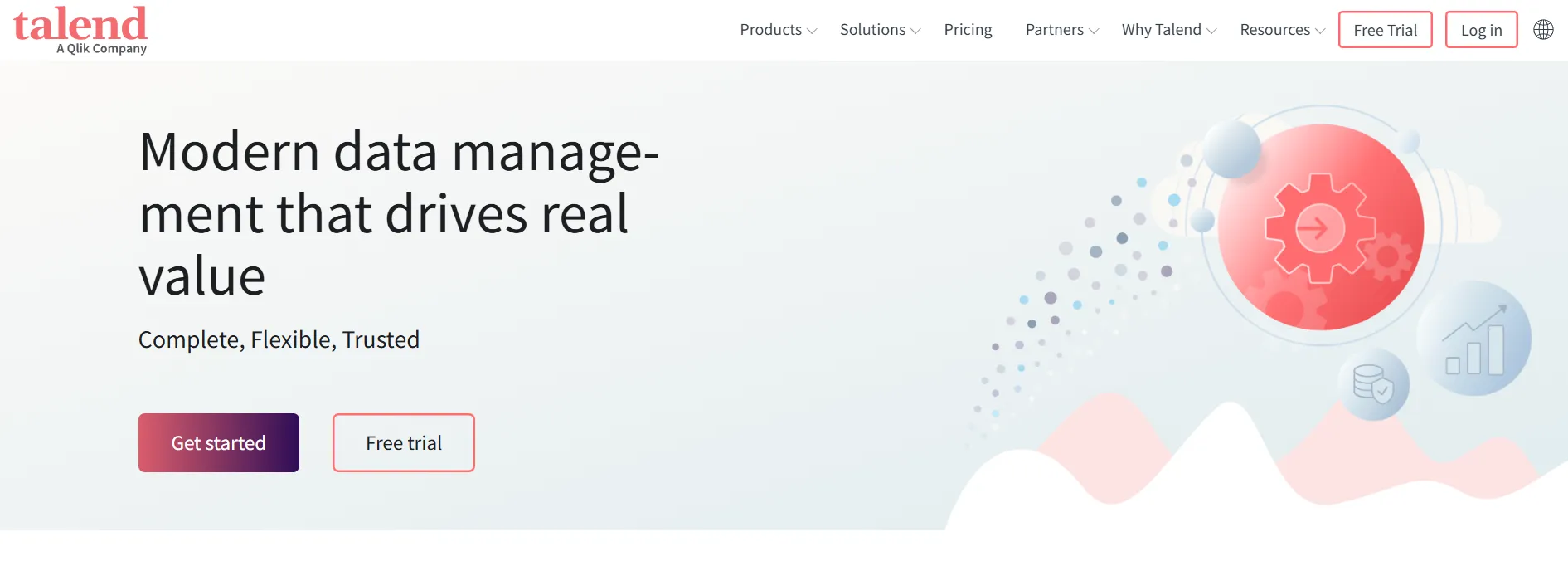
Talend is a versatile data integration and management platform designed to streamline the connection, transformation, and governance of data across on-premise and cloud environments. Talend enables organizations to consolidate, cleanse, and transform data efficiently. Its robust functionality and extensive connectivity make it well-suited for complex workflows and enterprise-scale operations.
Key Features of Talend:
- Offers an integrated platform covering data integration, quality, and master data management, ensuring seamless connectivity across varied systems. It empowers organizations to consolidate and cleanse data effectively, thereby streamlining workflows and supporting real-time analytics.
- Supports both batch and real-time processing with advanced transformation capabilities, enabling efficient data workflows across diverse environments while ensuring data governance and consistency.
8. Apache Nifi
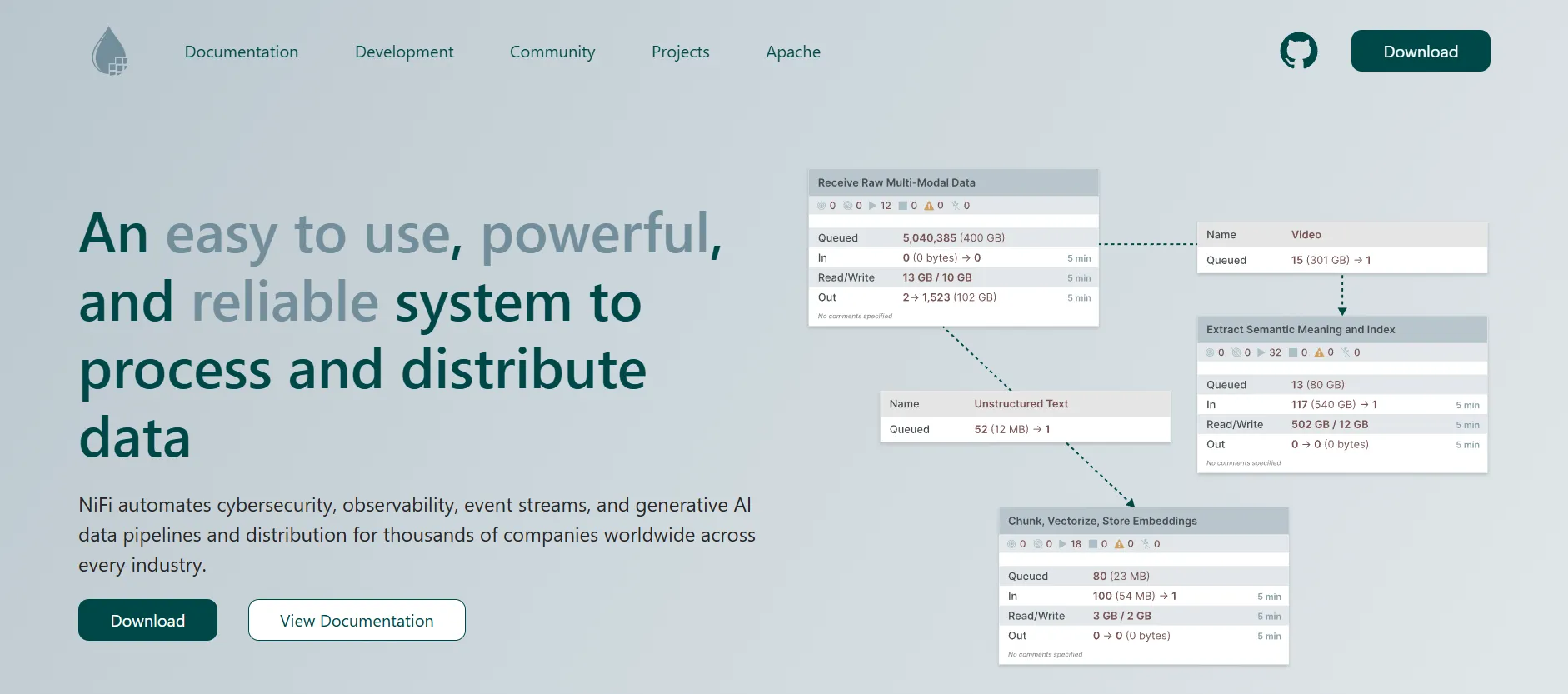
Apache NiFi is an open-source data integration tool designed for automating and managing real-time data flows between systems. Its highly configurable, scalable architecture allows organizations to design, monitor, and control data pipelines with ease. Emphasizing data provenance and security, NiFi is ideal for dynamic environments that require flexible, event-driven data processing.
Key Features of Apache Nifi:
- Features an intuitive, web-based interface that simplifies the design and monitoring of complex, real-time data flows. Users can easily create, modify, and manage pipelines while ensuring secure and reliable data routing across diverse systems.
- Delivers robust data provenance and security features, providing complete visibility and traceability of data movements. This ensures compliance with regulatory standards and builds trust in data integrity across integration scenarios.
9. Informatica Cloud Data Integration
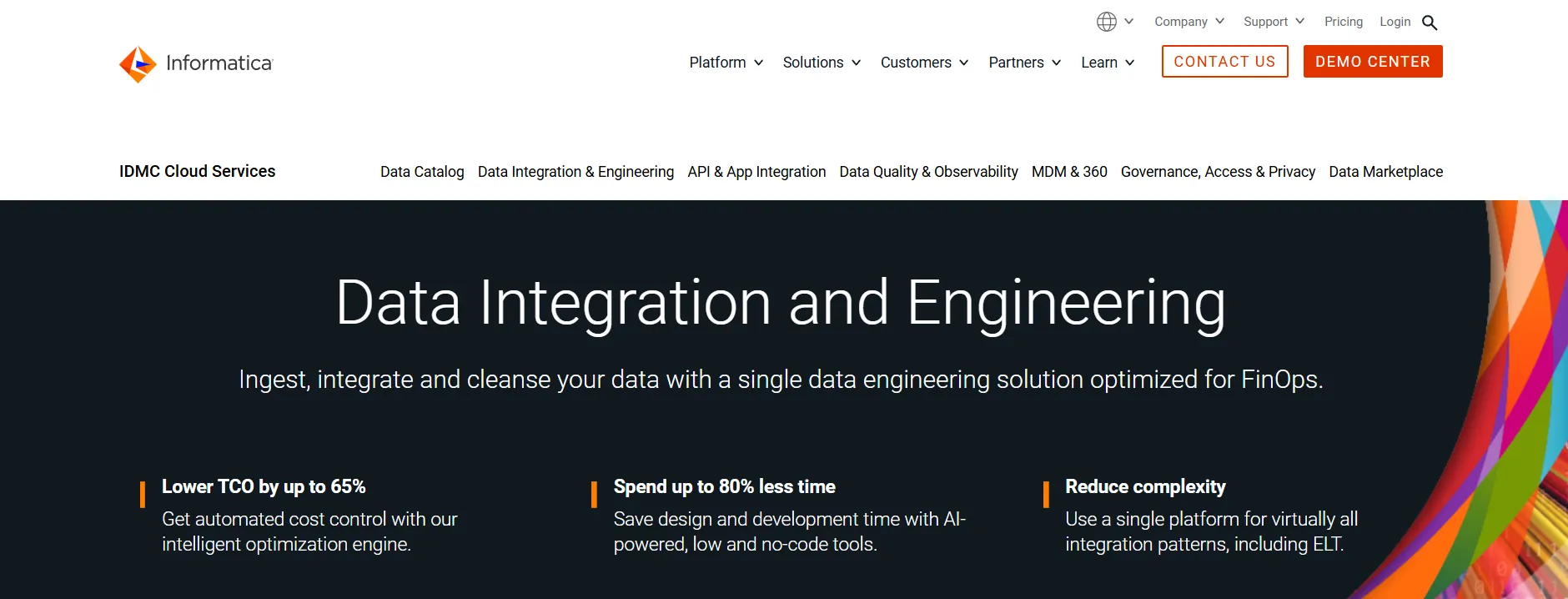
Informatica Cloud Data Integration is an enterprise-grade, cloud-based platform designed for robust data management and integration. It offers a comprehensive suite of tools for data connectivity, transformation, and governance, enabling organizations to manage complex workflows across hybrid environments. Its scalable architecture and advanced automation make it a preferred choice for large enterprises with stringent data quality and compliance requirements.
Key Features of Informatica Cloud Data Integration:
- Provides extensive connectivity to a wide range of cloud and on-premise data sources, enabling seamless integration and movement across diverse environments. Advanced transformation and data quality features ensure accuracy and consistency throughout workflows.
- Integrates robust governance and security protocols with real-time processing capabilities, facilitating compliance with industry standards and supporting enterprise-wide data initiatives with efficiency.
10. Integrate.io
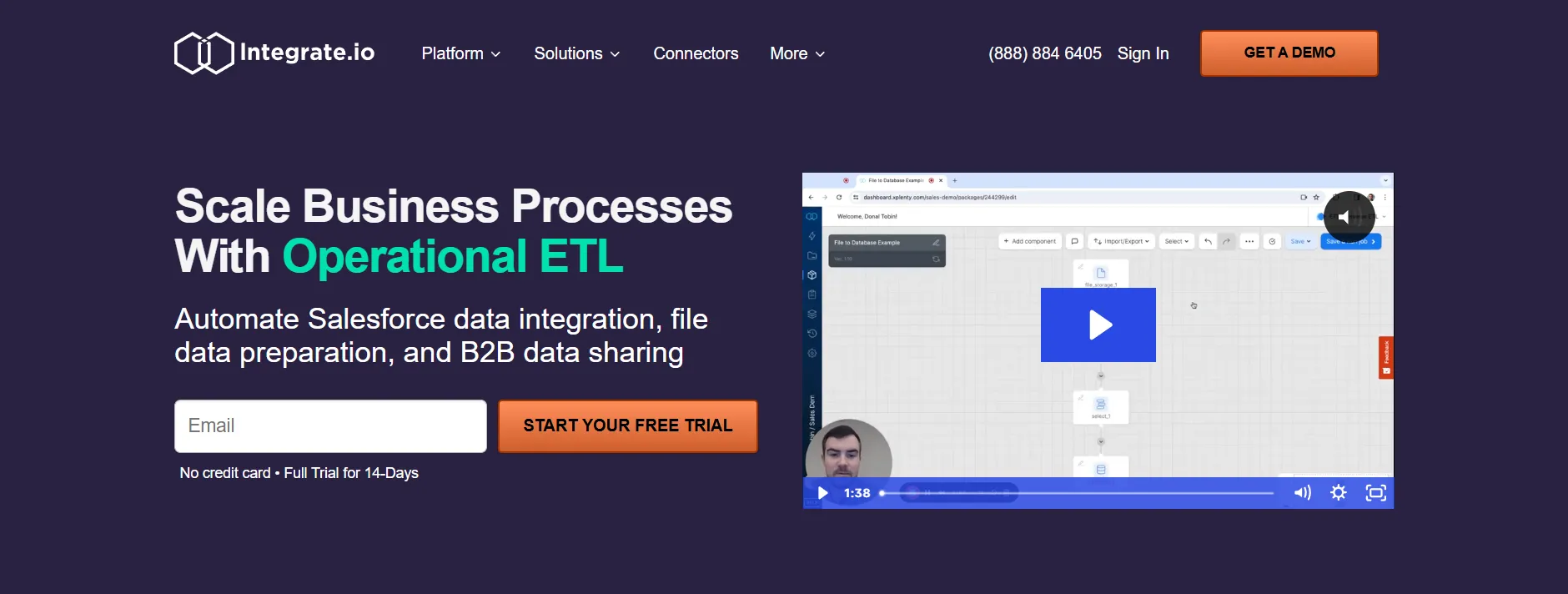
Integrate.io is a cloud-based ETL solution designed to simplify data integration and transformation for businesses of all sizes. With an intuitive, drag-and-drop interface and robust connectivity options, it allows organizations to efficiently create and manage data pipelines. Its scalable architecture supports both batch and real-time processing, making it a practical, cost-effective alternative in today’s competitive ETL market.
Key Features of Integrate.io:
- Offers a user-friendly, drag-and-drop interface that simplifies the creation and management of data pipelines, reducing development time and technical complexity. This intuitive design makes it accessible to users with varying technical skills.
- Supports both batch and real-time processing with robust data transformation capabilities. An extensive library of pre-built connectors and a scalable cloud architecture enable seamless integration across multiple data sources, enhancing overall system performance.
Why Consider Matillion Alternatives?
What should you do next?
Hope you enjoyed the reading. Here are the 3 ways we can help you in your data journey:




.webp)